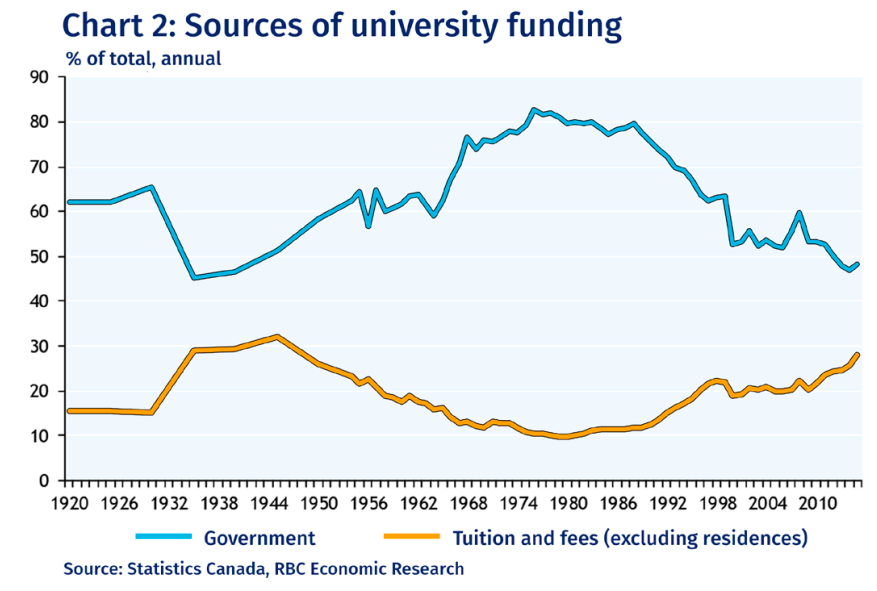Students asking universities for refunds, but it's not that simple

When Ye En Kim came to Canada to study engineering, she was eager to practice at McGill University’s state-of-the-art labs in Montreal. She wanted to get hands-on knowledge in research projects and immerse herself in Canadian culture. COVID-19 quickly ruined that strategy, leading to class suspensions, campus closures and online classes. The labs closed, shutting Kim out of what she sees as a valuable part of her education.
“After the two weeks’ suspension of courses due to the pandemic, I expected an extension of the semester,” explained Kim. “But that did not happen.” Despite the disruption, the university outlined that there will be no general consideration of refunds for the winter 2020 semester. Hearing frustration from other students, and inspired by the petitions in the U.S. by New York University, Kim launched a petition on behalf of the McGill student community for a partial tuition refund.
The cost of university tuition - which last held a national undergraduate average of $6,463 a year for domestic students and $29,714 for international students, according to Statistics Canada—have long been justified by the need to pay teachers’ salaries, fund campus resources and student groups, and pay for research and other costs. Now that many resources are inaccessible, students are left wondering what they’re paying for.
Students who signed the McGill petition aired their grievances online, arguing that the price didn’t match the online lectures they were getting, many of which were re-posted lectures from last year’s course, according to students. Kim acknowledged that McGill is doing its best under the circumstances, but it left many students feeling that they were not consulted.
McGill is not the only school to be the target of a petition. Students at University of British Columbia, Queen’s University in Ontario, and University of Toronto followed suit. The financial anxiety is exacerbated by the fact that most pandemic-related job losses affected Canadians aged 15 to 24 with 873,000 jobs lost between February and April. The federal government announced that students would be eligible for a $1,250 emergency funding relief starting Friday to ease the burden.
Aside from returned fees on residences and select course fees, most of the major Canadian universities claimed that they are unable to give refunds right now.
Universities that are not issuing general tuition refunds include the University of Montreal, University of British Columbia, University of Alberta (though they have increased student bursaries), University of Waterloo (though the school reduced or eliminated a number of fees) and the University of Western Ontario. University of Ottawa and Ryerson University have not confirmed plans prior to publication. At the University of Toronto, students who have had to abandon their studies due to COVID-19 illness will be reimbursed.
The demand for refunds puts universities in a difficult place – if they wanted to give mass refunds to all students, it’s not certain they could afford it.
Alex Usher, the president of Higher Education Strategy Associates, says many tuition-dependent institutions are in a particularly precarious financial situation, especially when the fall term rolls around.
“I think with the Fall term, you’re probably looking at a drop in tuition income of 10 per cent. These losses that we’re seeing in tuition are going to lead to job losses because the system runs on tuition fees, at least in part.”

Universities have been increasingly reliant on tuition revenue. RBC’s “Cost of Credentials” report said that money transfers from Ottawa were more generous from the mid-1970’s until the 1990’s when the trend began to reverse and tuition and fees picked up a larger portion of the tab. This trend, combined with the growth of staff salaries, resource and service expansions and other costs that grew ahead of inflation, contributed to large undergraduate tuition price tags, according to Usher.
The burden has largely fallen on international students like Kim, who pay a much larger premium to attend school in Canada. This has been a large source of revenue for post-secondary institutions, and the source that will likely take the biggest hit because of COVID-19.
“It’s very unlikely that there’s a new class of international students coming,” Usher told Yahoo Finance Canada. “So, you’ve got a new class of students coming in, that’s a quarter of the new students you’re going to have, plus some of the ones who were here last year are not going to come back.”
The strain on international students is a concern echoed by Nicole Brayiannis, the deputy chairperson at the Canadian Federation of Students.
“One of the student groups that we’re most concerned about right now is international students in being able to continue their studies, because they’re actually excluded from being able to claim the [Canada Emergency Student Benefit],” she said.
Brayiannis said the CFS was campaigning for more support for students from abroad, though this experience may have soured many of them from wanting to attend Canadian institutions any time soon.
Domestic students also have their doubts about fall semester plans. According to a survey commissioned by the Canadian Federation of Students, 30 per cent of new and returning students said they may change their plans for the next semester. This drop in revenue could damage the university balance sheet. Universities may be tempted to ask the federal government for a bailout, a possibility that Usher says is unlikely, though he hasn’t entirely ruled out.
The COVID-19 pandemic has thrown post-secondary institutions’ financials through a loop, deepening a complex situation. Kim says for students like her this new online model isn’t the service she paid for.
“I believe that cannot equal what we were offered with the experience.”

